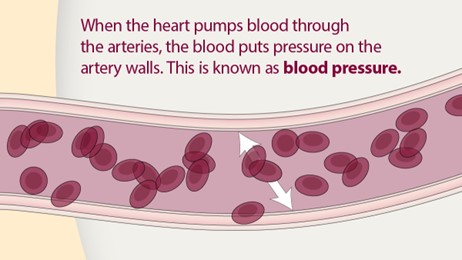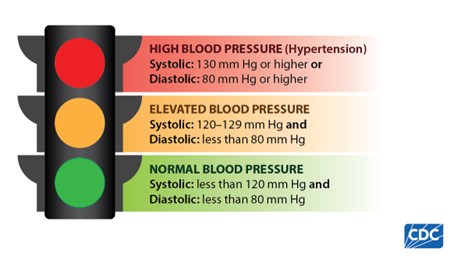Key points
- High blood pressure (hypertension) is consistently at or above 130/80 mm Hg.
- High blood pressure typically has no signs or symptoms but can cause problems for your heart, brain, kidneys, and eyes.
- No matter your age, you can take steps each day to keep your blood pressure in a healthy range.
- Some people may be able to control their blood pressure by making lifestyle changes or taking blood pressure medicines.
Definition of high blood pressure
Blood pressure is the pressure that occurs when blood pushes against the walls of your arteries. Arteries carry blood from your heart to other parts of your body.
Normal blood pressure is less than 120/80 mm Hg.1
High blood pressure, also called hypertension, is blood pressure that is higher than normal.
High blood pressure is consistently at or above 130/80 mm Hg.1
Your blood pressure changes throughout the day based on your activities. Having blood pressure consistently above normal may result in a diagnosis of high blood pressure.
The higher your blood pressure levels, the more risk you have for other health problems, such as heart disease, heart attack, and stroke.
Learn about how you can prevent and treat high blood pressure during pregnancy, which can put you and your baby at risk for health problems.

When the heart pumps blood through the arteries, the blood puts pressure on the artery walls. This is called blood pressure.
Diagnosis
Your health care team can diagnose high blood pressure. They can also make treatment decisions by reviewing your systolic (first number) and diastolic (second number) blood pressure levels and comparing them to guidelines. Most health care professionals will use these guidelines from the ACC and AHA to diagnose high blood pressure.

An illustration of a stoplight to correlate the three levels of blood pressure with the colors of the stoplight where red is HIGH BLOOD PRESSURE (Hypertension): Systolic is 130 mm Hg or higher or Diastolic is 80 mm Hg or higher. Yellow colored light …
Show More
If a health care professional diagnoses you with high blood pressure, talk with your health care team about your blood pressure levels and how they affect your treatment plan.
Learn how and where to measure your blood pressure and why it’s important to know your numbers.
High blood pressure usually has no warning signs or symptoms, and many people do not know they have it. Measuring your blood pressure is the only way to know whether you have high blood pressure.
There are several causes of and risk factors for high blood pressure. Fortunately, you can control many of them.
High blood pressure usually develops over time. It can occur because of unhealthy lifestyle choices, such as not getting enough regular physical activity.
Certain health conditions, such as diabetes and obesity, can also increase the risk for developing high blood pressure. And high blood pressure can occur during pregnancy.
People who have depression, anxiety, stress, or post-traumatic stress disorder over a long period of time may develop other health problems, including an increased heart rate and high blood pressure.
Other risk factors, such as family history and the environment, can also increase a person’s risk for high blood pressure.
Potential problems having high blood pressure could cause
High blood pressure can damage your health in many ways. It can seriously hurt important organs like your heart, brain, kidneys, and eyes.
The good news is that, in most cases, you can manage your blood pressure to lower your risk for serious health problems.
